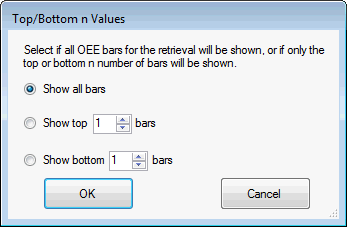 Note: OEE charts settings and all other settings in the Chart overrides node on the Settings dialog can be saved as a chart skin. See Chart Skins for more information.
Note: OEE charts settings and all other settings in the Chart overrides node on the Settings dialog can be saved as a chart skin. See Chart Skins for more information.Set options for OEE (Overall Equipment Effectiveness) chart types.
 Note: OEE charts settings and all other settings in the Chart overrides node on the Settings dialog can be saved as a chart skin. See Chart Skins for more information.
Note: OEE charts settings and all other settings in the Chart overrides node on the Settings dialog can be saved as a chart skin. See Chart Skins for more information.
|
Contents [Hide] |
Follow this path on the Settings dialog:
Chart overrides | Charts | OEE chart options
Follow this path on the Configuration tab of the System Administration module:
Configurations | "Configuration" | Chart defaults | OEE charts
Setting goal colors example:
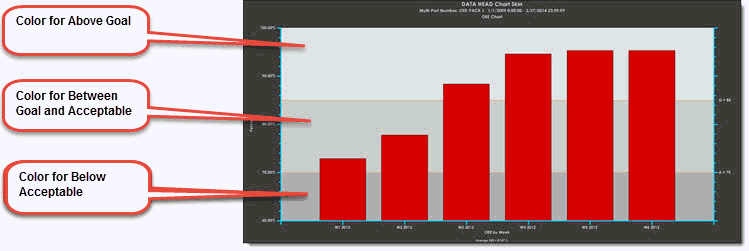
Change the background color for the chart zone above the line set for the goal.
Change the background color for the chart zone located below the line set for Acceptable data. The GainSeeker default setting is (LightCoral).
Change the background color for the chart zone for acceptable data, data that plots below the Goal zone and above the Acceptable zone. The GainSeeker default setting is (NavajoWhite).
Select the checkbox to display bars for the data on an OEE chart. The GainSeeker default setting is a line chart.
Select this checkbox to display numerical values at data points on any OEE chart as shown in this example:
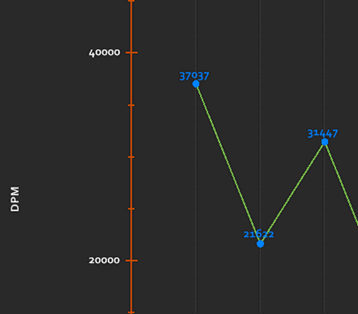
Set percentage values between 0% and 100% to display goal and acceptable limits horizontal lines on charts. These setting can help gauge improvement and tell you when any of the submetric percentages for OEE, Availability, Performance, or Quality fall below set historical values, for example. Some of the settings have GainSeeker default values set that you can change; others have no default values.
Group data by a specific time period or by a traceability item you select for OEE charts. Then, you can optionally select second-level grouping to display data grouped by both as bar plots on a single chart.
 Note: This setting can be located following this path on the Settings tab:
Note: This setting can be located following this path on the Settings tab:
Retrieval/Configuration | Group data for OEE chart by
Use this setting to set the high value for the y-axis percentage range.
The y-axis on an OEE chart displays a percentage that ranges between 0% and 100%, depending on where the data plots. You can set the y-axis to always display a specific percentage value at the high and/or the low end. Setting a specific percentage range (75% and 100%, for example) can be used to normalize the chart scaling, making variance more easy to view for data that may plot in wide ranges.
Set the low value for the y-axis percentage range.
The y-axis on an OEE chart displays a percentage ranging between 0% and 100%, depending on where the data plots. You can set the y-axis to always display a specific percentage value at the high and/or the low end. Setting a specific percentage range (75% and 100%, for example) can be used to normalize the chart scaling, making variance more easy to view for data that may plot in wide ranges.
Change the default method GainSeeker uses to calculate the OEE Quality metric.
By default, GainSeeker takes lost time into account when calculating the OEE Quality metric. This can tell you how much time was lost in producing defective parts—those that do not qualify as first-pass yield. The calculation GainSeeker uses is Quality % = Time to Produce Good Parts / Time to Produce Total Parts
To change the default setting so that GainSeeker instead calculates the percentage of produced good parts relative to the total number of produced parts (the calculation GainSeeker will use is Quality = Good Parts Produced / Total Parts Produced), deselect the checkbox preceding the Take lost time into account when calculating OEE Quality.
See the OEE "Quality" metric for more information and examples on both settings.

By GainSeeker default, there are horizontal zones on OEE charts for goals and acceptable limits feature colors, such as in the example below.
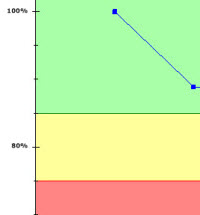
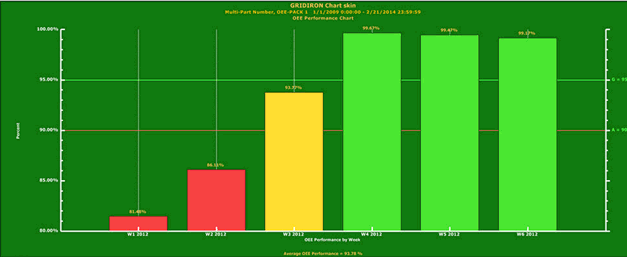
Also see Goals and Acceptable targets setting
Temporarily display only the top n or bottom n values on an OEE bar chart.
When the data is sorted by date, the bars display on the chart by the value order instead of by date.
Note: When Show top n bars or Show bottom n bars is selected for an OEE chart with second-level grouping, the data does not group to properly reflect the second-level setting.
Displaying only the top n values when you track multiple machines, for example, can help you quickly identify your machines with the least problems.
Double-click the setting to open the Top/Bottom n Values dialog.
Select the option button to show the top, bottom, or all bars. Then, choose the number of bars to display for your selection.
